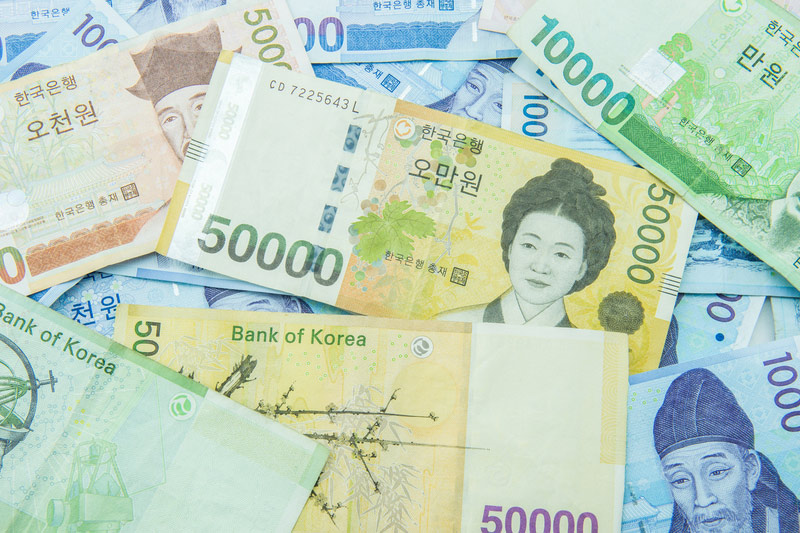Asian Currencies Falter Amid Geopolitical Tensions and South Korean Political Crisis
Asian currencies experienced a widespread decline on Monday, with the South Korean won bearing the brunt of the losses. This downturn comes amid heightened political turmoil in South Korea and escalating geopolitical tensions in the Middle East, which have dampened investor confidence in riskier assets. Adding to the pressure is a strengthening US dollar and persistent concerns about a potential US-China trade war under the incoming Trump administration.
The South Korean won plummeted nearly 1% against the US dollar, reaching a two-year low. This latest drop follows a 2% decline last week and a staggering 10% depreciation against the greenback since the start of 2024. The won’s woes stem from an intensifying political crisis engulfing President Yoon Suk Yeol, who is facing a criminal investigation related to his recent attempt to impose martial law. While Yoon survived an impeachment vote, his political future remains uncertain, further destabilizing the South Korean economy and impacting investor sentiment.
The political instability in South Korea, a key player in the East Asian economy, has exacerbated the downward pressure on Asian currencies already struggling against a strengthening US dollar and trade war fears. The Taiwan dollar and the Singapore dollar also weakened, albeit less dramatically, against the US dollar, registering declines of 0.3% and 0.1% respectively.
Meanwhile, the Australian dollar remained largely unchanged ahead of a crucial Reserve Bank of Australia (RBA) rate decision scheduled for Tuesday. Market expectations suggest that the RBA will maintain its current interest rate stance, possibly softening its hawkish tone in light of recent indicators pointing towards a weakening Australian economy. The Indian rupee edged up slightly following the Reserve Bank of India’s decision to reduce a key bank reserve ratio aimed at injecting liquidity into the cooling Indian economy.
The Japanese yen held steady against the US dollar as investors remain divided on the likelihood of a Bank of Japan (BOJ) rate hike next week, following the release of revised GDP data. Although the Japanese economy grew slightly more than anticipated in the third quarter, the growth rate was significantly lower than the previous quarter, leaving investors uncertain about the BOJ’s next move. The Chinese yuan appreciated slightly against the US dollar after data revealed a larger-than-expected contraction in Chinese industrial output and subdued inflation in November, despite recent stimulus efforts. Market attention this week will be focused on China’s annual Central Economic Work Conference (CEWC) for indications of further stimulus measures from the country’s central bank.
The US dollar index experienced a marginal increase, while US Treasury yields also saw a slight uptick during Asian trading hours. Market participants await the release of US inflation data for November, scheduled for Wednesday, which is expected to offer insights into the Federal Reserve’s future interest rate policy. Current market expectations anticipate a 25 basis points rate cut by the Fed next week, despite Friday’s data showing stronger-than-expected US jobs growth in November. The interplay between these various economic and political factors will continue to shape the trajectory of Asian currencies and global financial markets in the coming days. The escalating geopolitical tensions in the Middle East, particularly the reported ousting of Syrian President Bashar al-Assad and the involvement of Israeli forces in Syria, have further contributed to the risk-off sentiment prevailing in the markets. These developments add another layer of complexity to an already volatile global landscape, potentially influencing investor decisions and impacting currency movements.
The political turmoil in South Korea underscores the interconnectedness of political and economic stability, especially in a region as economically integrated as East Asia. The uncertainty surrounding President Yoon’s future and the ongoing investigation are likely to weigh heavily on investor confidence, potentially leading to further capital outflows and downward pressure on the won. The South Korean government’s response to this crisis will be closely scrutinized by markets and could have far-reaching implications for the country’s economic outlook.
The divergent economic performance and policy responses of various Asian economies are also contributing to the differentiated performance of their respective currencies. While India’s central bank has adopted a more accommodative stance to support its slowing economy, Australia’s central bank appears poised to maintain a more cautious approach. These varying policy trajectories reflect the unique challenges and opportunities facing each economy and will continue to influence currency valuations.
The upcoming US inflation data and the Federal Reserve’s subsequent interest rate decision will be key drivers of market sentiment in the coming week. A softer-than-expected inflation reading could reinforce market expectations of a Fed rate cut, potentially weakening the US dollar and providing some respite to Asian currencies. Conversely, a stronger-than-expected inflation print could fuel speculation of a more hawkish Fed stance, further strengthening the dollar and exerting renewed pressure on Asian currencies.
The ongoing geopolitical tensions in the Middle East, the political crisis in South Korea, and the impending US inflation data create a complex and uncertain backdrop for global financial markets. Investors will closely monitor these developments and their potential impact on currency movements, seeking opportunities amidst the volatility while managing risks in a dynamic global environment. The focus on China’s CEWC highlights the increasing importance of China’s economic policies in shaping global market dynamics. The potential for further stimulus measures from the Chinese central bank is being closely watched by investors, as it could have significant implications for global growth and commodity prices. The outcome of the CEWC will provide valuable insights into the Chinese government’s priorities and its approach to addressing the current economic challenges.


